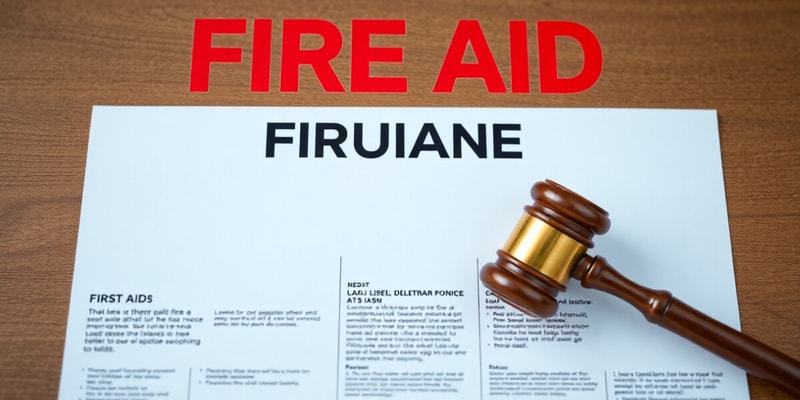Podcast Beta
Questions and Answers
What must be demonstrated to establish negligence in a first-aid scenario?
Which type of consent is assumed when a patient is unresponsive and in need of urgent care?
What is the implication of abandonment in the context of a criminal justice officer failing to provide care?
Which scenario best exemplifies negligence in first aid by a criminal justice officer?
Signup and view all the answers
A first-aid provider failed to administer care that a reasonably trained individual would provide. This failure is classified as what?
Signup and view all the answers
What type of consent is required before a criminal justice officer can render first aid?
Signup and view all the answers
Before proceeding with treatment, a first-aid provider must ensure which of the following?
Signup and view all the answers
Which of the following statements best describes 'duty to act' in the context of first aid?
Signup and view all the answers
What does the standard of care require from a criminal justice officer in an emergency situation?
Signup and view all the answers
What is a patient’s responsibility when receiving first aid from a criminal justice officer?
Signup and view all the answers
What is the primary factor that determines whether a patient's injury resulted from negligence?
Signup and view all the answers
What can lead to a breach of duty for a criminal justice officer?
Signup and view all the answers
Which scenario best illustrates 'expressed consent'?
Signup and view all the answers
What is the implication of 'damages' in a negligence claim in the first-aid context?
Signup and view all the answers
Which of the following reflects the legal definition of duty to act for law enforcement officers?
Signup and view all the answers
What key factor distinguishes the standard of care required from a criminal justice officer from that of a layperson?
Signup and view all the answers
What does abandonment signify in the context of providing first aid?
Signup and view all the answers
Which of the following best describes negligence as it applies to first-aid providers?
Signup and view all the answers
How does the Good Samaritan Act protect first-aid providers?
Signup and view all the answers
Which scenario would likely result in negligence for a first-aid provider?
Signup and view all the answers
Under what condition does a first-aid provider typically assume patient responsibility?
Signup and view all the answers
What is a first-aid provider likely to be held accountable for under negligence?
Signup and view all the answers
What role does the standard of care play for a criminal justice first aid provider?
Signup and view all the answers
If a first-aid provider exceeds their training while assisting a patient, what could be the implication?
Signup and view all the answers
Study Notes
Legal and Ethical Responsibilities of Criminal Justice First-Aid Providers
- Criminal justice officers have a duty to act which is a legal obligation to provide care, this duty can extend beyond their normal working hours and jurisdictional boundaries.
- Duty to Act: This is the requirement to take action to prevent harm to another, this can be contractual or legal and is dependent on the relationship between the parties and the surrounding circumstances. For correctional officers, this obligation is during working hours, while law enforcement officers have a 24/7 duty within their jurisdiction.
- The Standard of Care refers to the degree of care expected from a reasonably prudent person in a similar situation. This implies that the level of care provided should match that of a similarly trained criminal justice first aid provider.
-
Negligence is defined as the failure to provide the standard of care expected, this includes the following conditions:
- Duty to Act: There was a legal obligation to provide care.
- Breach of Standard of Care: Failure to act, or act inappropriately, as a reasonably trained professional would.
- Causation: The actions or inactions directly resulted in the patient's injuries.
- Damages: The patient was harmed as a result and the court is able to compensate them.
-
Consent is required before providing treatment and should be clear and unmistakable, this can be obtained through verbal or physical confirmation.
- Expressed Consent: Clearly stated permission, verbally or in writing.
- Implied Consent: Permission assumed through actions, this is relevant for unconscious patients at risk of death or deterioration.
- Informed Consent: Agreement after complete disclosure of facts, benefits, risks, and alternatives. This should be fully understood by the patient or their legal guardian.
- Good Samaritan Act: Provides legal protection for those providing emergency care in good faith, it does not prevent lawsuits but can defend those acting within their training and scope of practice. This can apply to law enforcement officers outside their jurisdiction and correctional officers off-duty.
- Abandonment: Occurs when care is stopped without ensuring that the patient receives continued or improved care, it is crucial to continue providing care until a qualified medical professional takes over, or you are unable to continue.
- Negligence: Failure to exercise the standard of care expected of a reasonably prudent person.
Studying That Suits You
Use AI to generate personalized quizzes and flashcards to suit your learning preferences.
Related Documents
Description
This quiz explores the legal and ethical responsibilities of criminal justice first-aid providers. It covers crucial concepts such as Duty to Act, Standard of Care, and Negligence. Enhance your understanding of the obligations faced by law enforcement and correctional officers in providing care to prevent harm.




